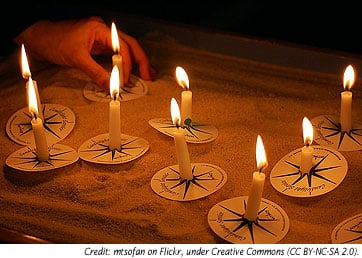
 (WOMENSENEWS)–As a victim advocate, I must take issue with the weight that Caryl Rivers and Rosalind C. Barnett place on research by Murray Straus in their book "The Truth About Girls and Boys."
(WOMENSENEWS)–As a victim advocate, I must take issue with the weight that Caryl Rivers and Rosalind C. Barnett place on research by Murray Straus in their book "The Truth About Girls and Boys."
In an excerpt recently published by Women’s eNews, "Women Are Aggressors in Household Violence Too," the authors write: "After a thorough review of the literature on who initiates violence in couples, Murray Straus, of the University of New Hampshire, reports: ‘It is painful to have to recognize the high rate of domestic assaults by women. All six major studies which have investigated this topic found that women initiate violence in a large proportion of the cases.’"
That finding, says Jack C. Straton, is part of a longstanding backlash on women’s safety. In his article "The Myth of the Battered Husband Syndrome," Straton raises three problems with studies Straus co-authored in 1980 that found nearly equivalent violence rates between men and women:
No 1: Using a set of questions that cannot discriminate between intent and effect and that "equates a woman pushing a man in self-defense to a man pushing a woman down the stairs." This questioning technique, he writes, "labels a mother as violent if she defends her daughter from the father’s sexual molestation. It combines categories such as ‘hitting’ and ‘trying to hit’ despite the important difference between them." Straton also says that Straus’ research looks at only one year. And that "equates a single slap by a woman to a man’s 15 year history of domestic terrorism."
No. 2: Straus interviewed only one partner, while other studies have found that partners’ accounts of violence did not match.
No. 3: Straus’ study "excluded incidents of violence that occur after separation and divorce," yet these account for nearly 80 percent of spouse-on-spouse assaults, with a male perpetrator 93.3 percent of the time, according to the U.S. Department of Justice.
(For the footnotes on all this read Straton’s full piece.)
Male Violence More Severe
 Rivers and Barnett were careful to note that male violence was far more severe, but Straton’s article provides critical detail.
Rivers and Barnett were careful to note that male violence was far more severe, but Straton’s article provides critical detail.
After analyzing the results of the U.S. National Crime Surveys, Straton writes that "sociologist Martin Schwartz concluded that 92 percent of those seeking medical care from a private physician for injuries received in a spousal assault are women. That same study shows that one man is hospitalized for injuries received in a spousal assault for every 46 women hospitalized."
This is a highly politicized field and so-called research must rise above any suspicion of bias or manipulation.
It’s also a field where under-reporting of abuse has been found by numerous studies.
In 2009, for instance, the Bureau of Justice found that 72 percent of intimate-partner violence against males and 49 percent of intimate-partner violence against females was reported to police the previous year and almost half (47 percent) of the rape or sexual assaults against women were reported.
Those statistics helped raise a big red flag for me when I came across a different survey that found a huge incidence of false accusations of abuse. It was conducted by Stop Abusive and Violent Environments (SAVE), an organization based in Rockville, Md., whose website says it is dedicated to "protecting victims, stopping false allegations and ending abuse."
The group’s 2011 study, "One in 10 Falsely Accused of Abuse," shows why it’s important to take a close look at the underlying methodology and terminology.
Based on a phone survey, the 1-in-10 false-accusation finding is based on individuals reporting that they have been falsely accused of committing abuse. Hmm…If you ask those serving time in prisons, a high percentage will likely say the same; but that doesn’t clear them of the crime.
Friends, Family Denial
The survey’s finding is also based on claims of innocence by friends and family members on behalf of the accused. There have been several cases where the accused admits to committing domestic violence or sexual assault and family and friends continue to deny it simply because they can’t handle the thought that their loved one could commit such an act.
I have witnessed this in my own work, but the story of Julie Rook Schebig, published by Madison Magazine in October, strongly illustrates the point. After five years of living with emotional and physical abuse, Schebig filed for divorce. Shortly after the marriage ended in August 2009, her ex-husband, Jerry Orton, called 911 to report he’d “just killed" his wife (she recovered). Despite that call, along with other evidence that came out in trial and led to a 22-year prison sentence, many of Orton’s friends and family stood by him and continue to blame Schebig.
The SAVE survey also finds more males falsely accused of abuse. Given that the majority of research and crime data show more males committing acts of violence, this is not surprising. If more males are committing the crimes, it stands to reason that more are being accused in the first place.
The SAVE researchers fail to provide a breakdown of respondents according to sex and gender. The numbers of men and women who participated could surely affect the results.
I am very aware that there are male victims of domestic abuse and I strongly believe that we need to provide them with support. Through the victim advocacy program that I run for the Quileute Tribe, I have and will continue to do so.
I am also aware that people sometimes make false accusations.
But neither of these facts should be used to minimize the degree to which girls and women take the brunt of household violence.
Would you like to Comment but not sure how? Visit our help page at https://womensenews.org/help-making-comments-womens-enews-stories.
Would you like to Send Along a Link of This Story?
https://womensenews.org/story/domestic-violence/111220/rebuttal-male-female-aggression-dont-equate
Monica Henry holds a master’s degree in gender and peace building from the United Nations Mandated University for Peace and has served as a domestic violence, dating violence, sexual assault, stalking and elder abuse victim advocate for the Quileute Tribe since 2006.


